Table of Contents
- Introduction
- Understanding Decentralized Search Engines
- Privacy-First Decentralized Search for Web3 Users
- Semantic Search Innovations in Decentralized Web3
- Blockchain Domain Integration with Decentralized Search
- Marketing Strategies Using Decentralized Search Engines
- Conclusion
- Resources
Introduction
The evolution of the internet is entering a phase where user empowerment, privacy, and decentralized ownership are at the forefront. At the core of this transformation are decentralized search engines, which are fundamentally reshaping the Web3 ecosystem. Unlike traditional search giants, these engines utilize blockchain technology and peer-to-peer protocols to deliver true censorship resistance and user data sovereignty. This article explores the crucial role that decentralized search engines play in unlocking uncensored, unbiased digital discovery for Web3 users, marketers, and developers.
Web3’s distributed paradigm promises autonomy and digital freedom, but it is the innovations in privacy-first and semantic search that truly unlock new opportunities for discoverability and marketing. These features ensure that each individual not only controls their data but also benefits from more meaningful, context-aware search experiences across decentralized platforms. By delving into the sophisticated architectures, governance models, and the most innovative platforms, this guide offers a holistic perspective for anyone seeking to master Web3 domain management and harness the dynamic potential of the decentralized web.
What Is a Decentralized Search Engine?
A decentralized search engine is a platform that distributes its indexing, ranking, and data management across a network—typically using blockchain and peer-to-peer (P2P) technologies—rather than relying on a centralized authority. Unlike Google or Bing, which control algorithms and data from a single source, decentralized engines offer censorship resistance, transparency, and a more equitable ecosystem for both users and content creators. By leveraging tokens and community-driven curation, these engines provide a competitive landscape where content rises on merit rather than manipulation or exclusive deals.
Why Decentralized Search Matters for Web3
The fundamental values of Web3—such as censorship resistance, data sovereignty, and privacy—demand that search infrastructure must not be controlled by a central gatekeeper. Centralized engines can suppress information, track users, or manipulate rankings. In contrast, decentralized search empowers users to retain control of their digital presence, guarantees immutability of results, and promotes open participation via transparent algorithms. These aspects directly address growing concerns about user autonomy and digital rights, making decentralized search an essential pillar for the evolution of the decentralized internet.
Overview of Privacy-First and Semantic Search Innovations
Two breakthrough innovations define the next generation of decentralized Web3 search:
- Privacy-first decentralized search engines: Engines designed from the ground up to minimize data collection, avoid behavioral profiling, and ensure that search activity cannot be monetized or surveilled by a single entity.
- Decentralized semantic search: Platforms leveraging AI and semantic web technologies to understand the context and intent of Web3 queries, allowing more meaningful results, especially when indexing blockchain domains and metadata.
These advancements not only support digital sovereignty but offer revolutionary improvements in discoverability and marketing authenticity for developers, organizations, and everyday Web3 users.
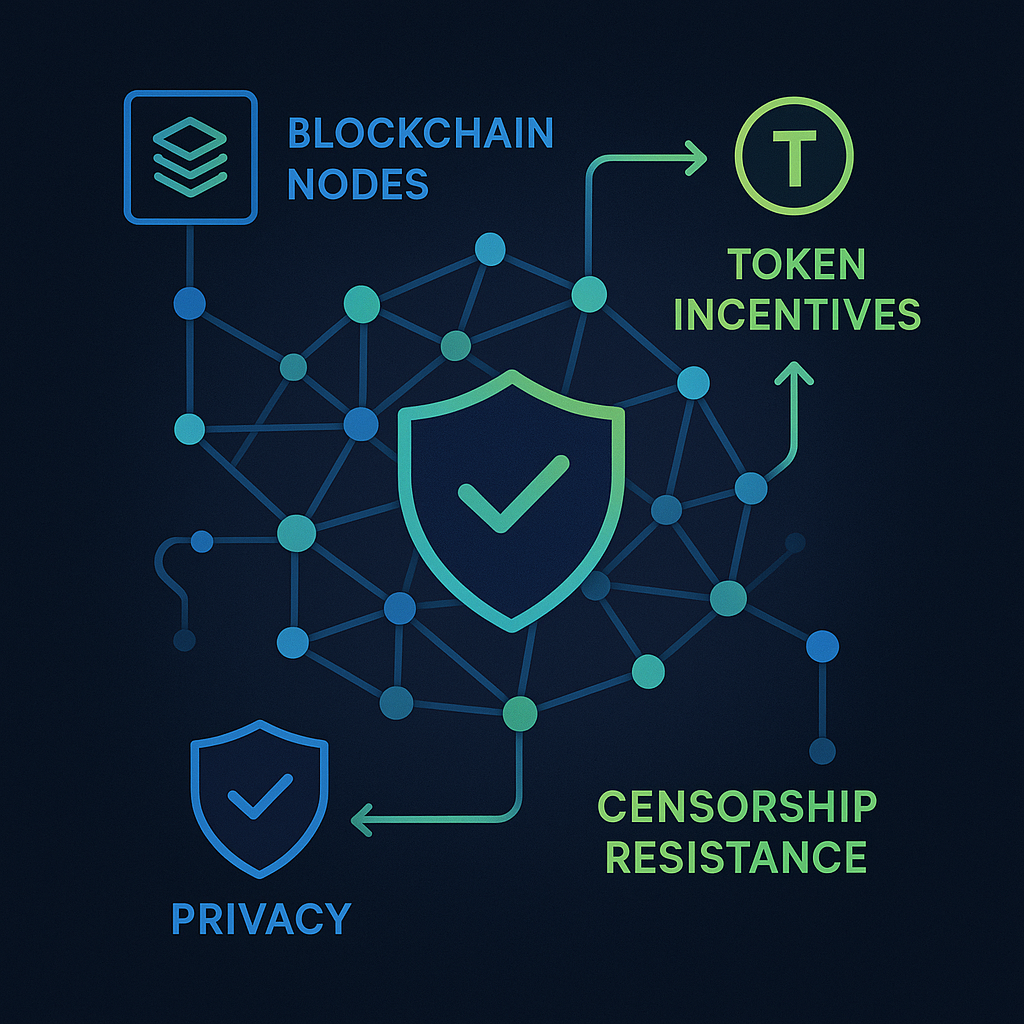
Understanding Decentralized Search Engines
Core Architecture and Technologies
The core architecture of a modern decentralized search engine is defined by several key innovations: distributed indexing, peer-to-peer (P2P) networking, and blockchain-based verification. In place of centralized databases, documents and web resources are indexed across autonomous nodes, each maintaining a subset of the overall index. This ensures resilience against shutdowns, censorship, or manipulation.
Decentralized indexing protocols, such as those demonstrated in SwarmSearch, use a combination of AI and distributed consensus to determine the relevance and trustworthiness of content. P2P networks facilitate robust, direct communication between nodes, ensuring that no single failure compromises the entire system. These networks rely on cryptographic hashing, consensus mechanisms, and reputation systems to maintain accurate and tamper-proof indices.
Additionally, the integration of blockchain technology secures data provenance and enables tokenized reward structures for node operators, content creators, and community participants. AI-based enhancements allow for adaptive filtering and improved search relevance, creating a dynamic and evolving search ecosystem that can rapidly incorporate new data without human gatekeeping.
Blockchain and Peer-to-Peer Integration
Blockchain technology serves as the backbone for transactional trust and immutability within decentralized search. By recording contributions, search events, and content updates on-chain, platforms ensure verifiable transparency and discourage manipulation. Peer-to-peer integration—used in platforms like 0xSearch and Presearch—eliminates dependence on centralized servers, further enhancing censorship resistance and privacy.
Notably, these technologies allow decentralized search engines to operate even in adversarial environments where governments or corporations might seek to restrict access. With cryptography and distributed consensus, users can verify the authenticity and completeness of results, while algorithmic governance ensures the system adapts to stakeholder input.
The inclusion of AI in decentralized search is especially significant. AI models powered by distributed learning (such as federated learning) enable context-aware search, anomaly detection, and the removal of low-quality or malicious content—without sacrificing user privacy or introducing centralized control.
Incentivization and Token Economies
To maintain network participation and high-quality indexing, most decentralized search engines implement token economies. These systems issue native tokens that incentivize:
- Running search and indexing nodes
- Validating new content or search results
- Participating in community governance and algorithm updates
Users can earn tokens for searches, curation, and content contributions, which can be staked or spent for premium features. Token holders often participate in community governance, voting on search algorithms, content moderation, and platform policies, ensuring sustained decentralization.
This model creates self-sustaining ecosystems like SwarmSearch and Presearch, where economic incentives align user interests with the network’s health. The result is an ecosystem that is open, robust, and constantly refining itself through stakeholder engagement.
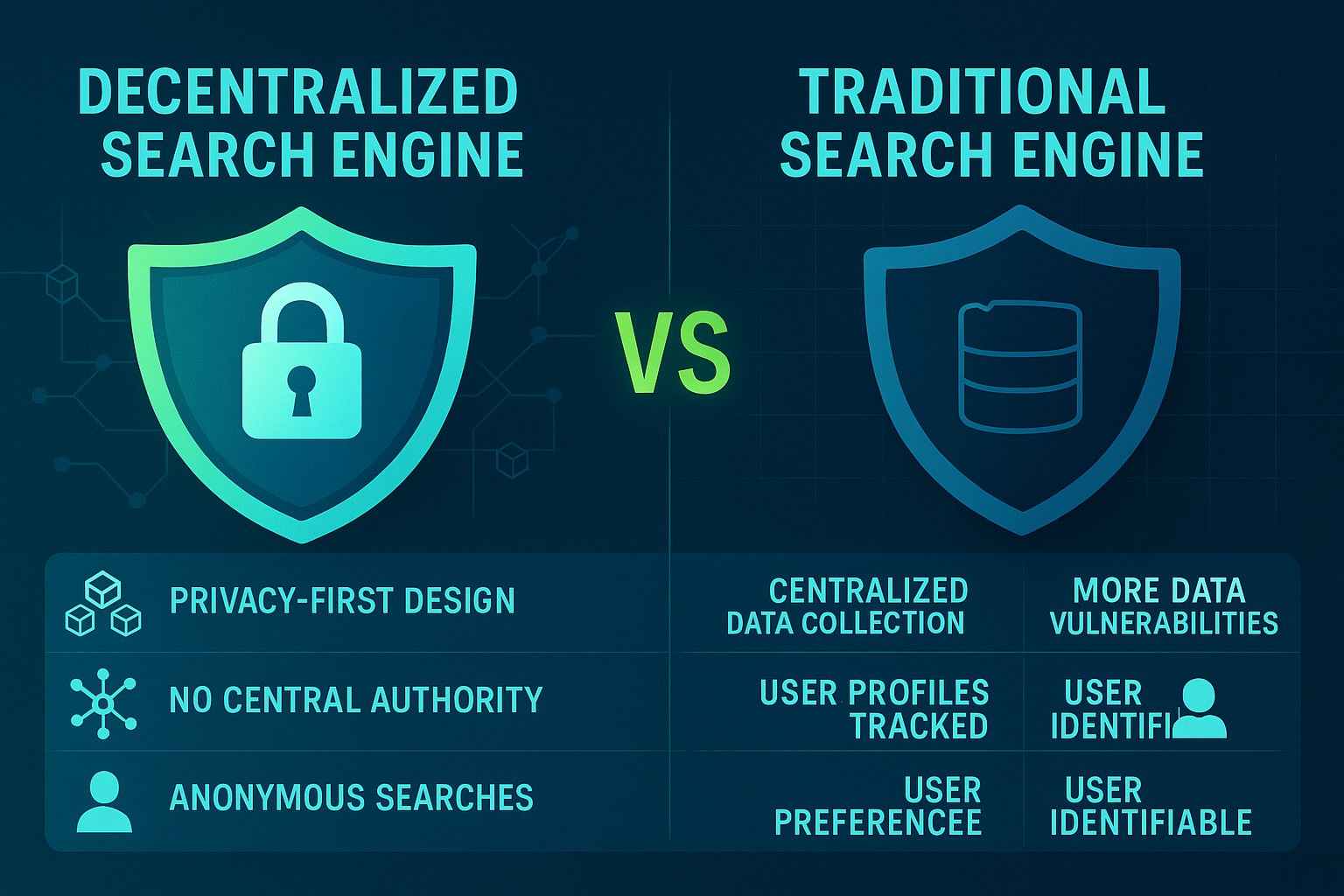
Privacy-First Decentralized Search for Web3 Users
Privacy Benefits Compared to Centralized Engines
Traditional search engines aggregate massive datasets on users’ activities—a model that raises privacy risks and enables intrusive ad targeting. By contrast, privacy-first decentralized search engines are engineered to avoid tracking, profiling, and centralized data monetization. Indexing and search activities are anonymized, with only non-identifying data exchanged among nodes.
The result is that searches cannot be traced back to individuals, curbing personal data exploitation. Platforms like Presearch and 0xSearch empower users to explore the Web3 landscape without surrendering their identities or compromising their browsing habits.
Over 70% of surveyed Web3 users expressed concern about privacy on centralized platforms, driving mass adoption of decentralized alternatives that guarantee digital sovereignty.
User Anonymity and Data Control
User-anonymity is achieved through a blend of zero-knowledge proofs, encrypted queries, and pseudonymous identities. Decentralized search engines can employ onion routing (much like Tor) or custom cryptographic mechanisms to obscure both the source and content of search requests. This ensures that even if data is intercepted, it cannot be meaningfully linked to a specific user.
Data control mechanisms also give users the right to curate, store, or delete their search histories, with no central entity holding a full record. User-owned credentials, typically managed by blockchain-linked wallets, authorize secure participation without exposing personal details. Such infrastructure is essential for users seeking autonomy and long-term privacy in their online activities.
Leading Privacy-Focused Platforms
Presearch
A flagship community-powered search engine, Presearch rewards users and node operators with native tokens for participation. Its community governance model ensures platform changes reflect broad stakeholder interests, not just those of a single owner. Privacy is inherent, with no behavioral tracking or commercial reselling of data.
0xSearch
Positioned as a blockchain-focused engine, 0xSearch delivers censorship-resistant access to dApps and related content. Its peer-to-peer architecture anonymizes requests and shields query data from centralized exploitation, prioritizing user-first privacy in every interaction.
Web3 Compass
Web3 Compass is a leading portal for decentralized web discovery, providing privacy-focused tools and semantic search tailored for comprehensive, context-aware results. Its focus on education and transparency makes it a model for the next generation of privacy-preserving Web3 user experiences.
Semantic Search Innovations in Decentralized Web3
What Is Decentralized Semantic Search?
Semantic search moves beyond basic keyword matching to grasp the meaning and context behind queries. In a decentralized environment, this capability is powered by distributed, AI-enhanced algorithms that analyze intent, relationships, and metadata across blockchain content. This empowers engines like Web3 Compass to return results that address the true needs and contexts of users—even across rapidly evolving smart contract and dApp ecosystems.
Improving Blockchain Content Discovery
The Web3 landscape, filled with dynamic dApps and ever-changing contracts, benefits enormously from decentralized semantic search. By interpreting relationships between blockchain addresses, domain metadata, and user queries, engines can:
- Surface relevant dApps and protocols faster
- Uncover new DeFi instruments or DAOs that fit a user’s profile
- Provide context on regulatory status or transaction history
AI-powered federated learning, as explored in recent research, allows semantic models to be trained across networks without centralized data aggregation, protecting user privacy while increasing accuracy.
Platforms Offering Semantic Search Capabilities
Projects like SwarmSearch utilize a self-funding, AI-driven approach to semantic search, combining peer-to-peer indexing with intelligent ranking algorithms. Web3 Compass stands out for its real-time semantic analysis of decentralized protocols, while Presearch continues to expand aggregated, context-aware discovery tools.
SwarmSearch has shown that integrating AI with distributed indexing can deliver both scalability and semantic depth—enabling users to find not just documents, but meaningfully related information across the blockchain.
Integration with Decentralized Applications
Embedding semantic search within dApps, wallets, and Web3 browsers empowers frictionless user journeys. Users can search for domains, dApps, or assets using natural language, with the system interpreting context (like a wallet’s owned tokens or favorite protocols) to surface personalized results. Developers can also leverage open protocols or SDKs to add semantic search capabilities to their own projects, establishing competitive advantage through enhanced discovery and stickier user engagement.
This integrated approach not only facilitates richer experiences for end users but also improves discoverability for dApp developers and content creators, leading to a more vibrant, connected Web3 ecosystem.
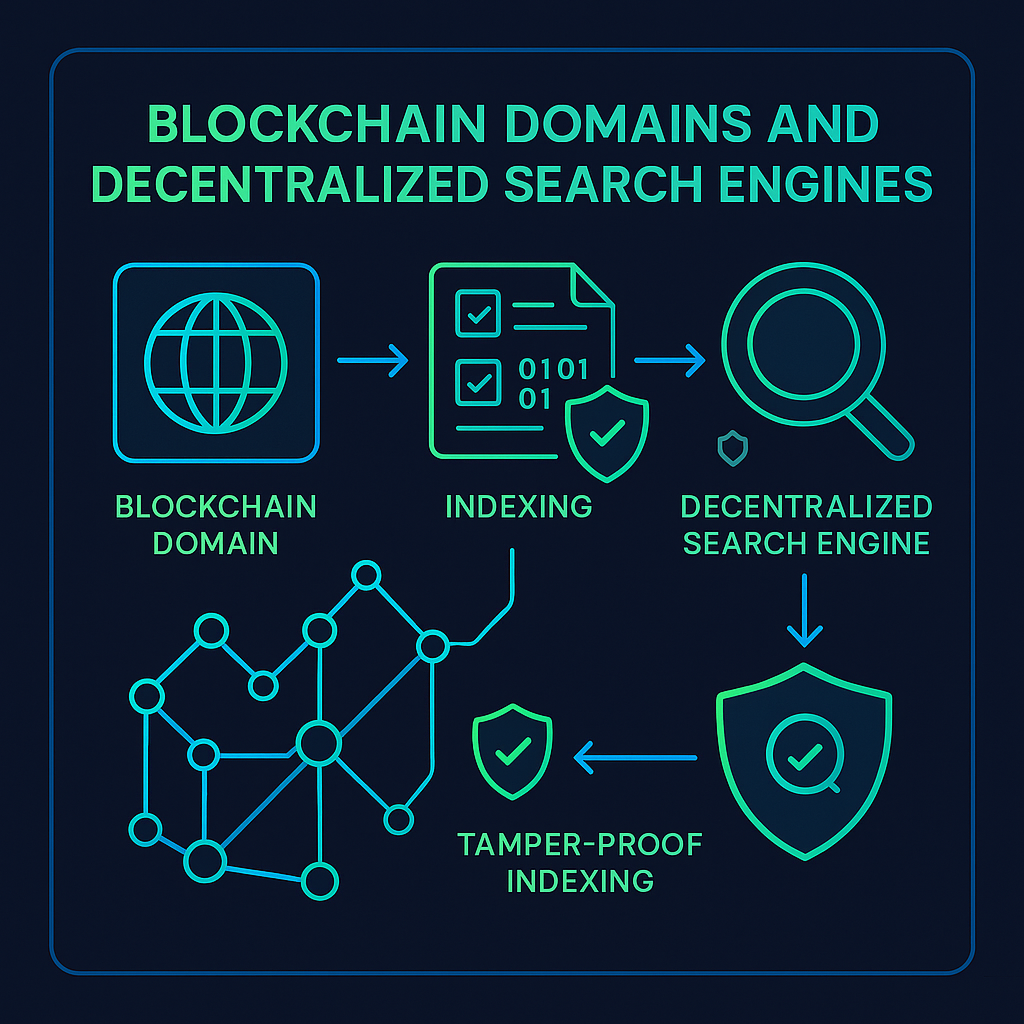
Blockchain Domain Integration with Decentralized Search
Indexing Blockchain Domains
Blockchain domains represent unique digital identifiers registered on-chain (via protocols like Ethereum or Unstoppable Domains), replacing legacy DNS. Decentralized search engines index these domains through distributed protocols, mapping them to content, digital identities, or smart contracts. This secure, censorship-resistant process enables:
- Hosting of truly decentralized websites without reliance on central authorities
- Transparent resolution of addresses, tamper-proof by nature
- Direct integration of on-chain data for rich, AI-enhanced search experiences
Enhancing User Trust and Transparency
By leveraging the immutability and provenance offered by blockchain, decentralized search platforms provide audit trails for all indexed data. This means that once a domain or record is indexed, it cannot be retroactively altered or removed by any third party. As a result, users gain trust in their searches, knowing information is transparent and immune to stealth manipulation or shadow bans.
In marketing, this level of transparency fosters brand credibility and reassures users that advertised content is verifiable, not artificially promoted by hidden algorithms or paid placements.
Use Cases in Web3 Marketing
Marketers leveraging blockchain domain visibility in decentralized search can establish genuine, trusted digital presences:
- Launch projects with domains that are provably owned and controlled by the team
- Use semantic metadata and verified smart contract links to improve discoverability
- Build communities around transparent, on-chain reputations and domain histories
Blockchain-integrated search engines give projects a definitive edge in user acquisition and retention by aligning digital identity and trust with user-controlled infrastructure.
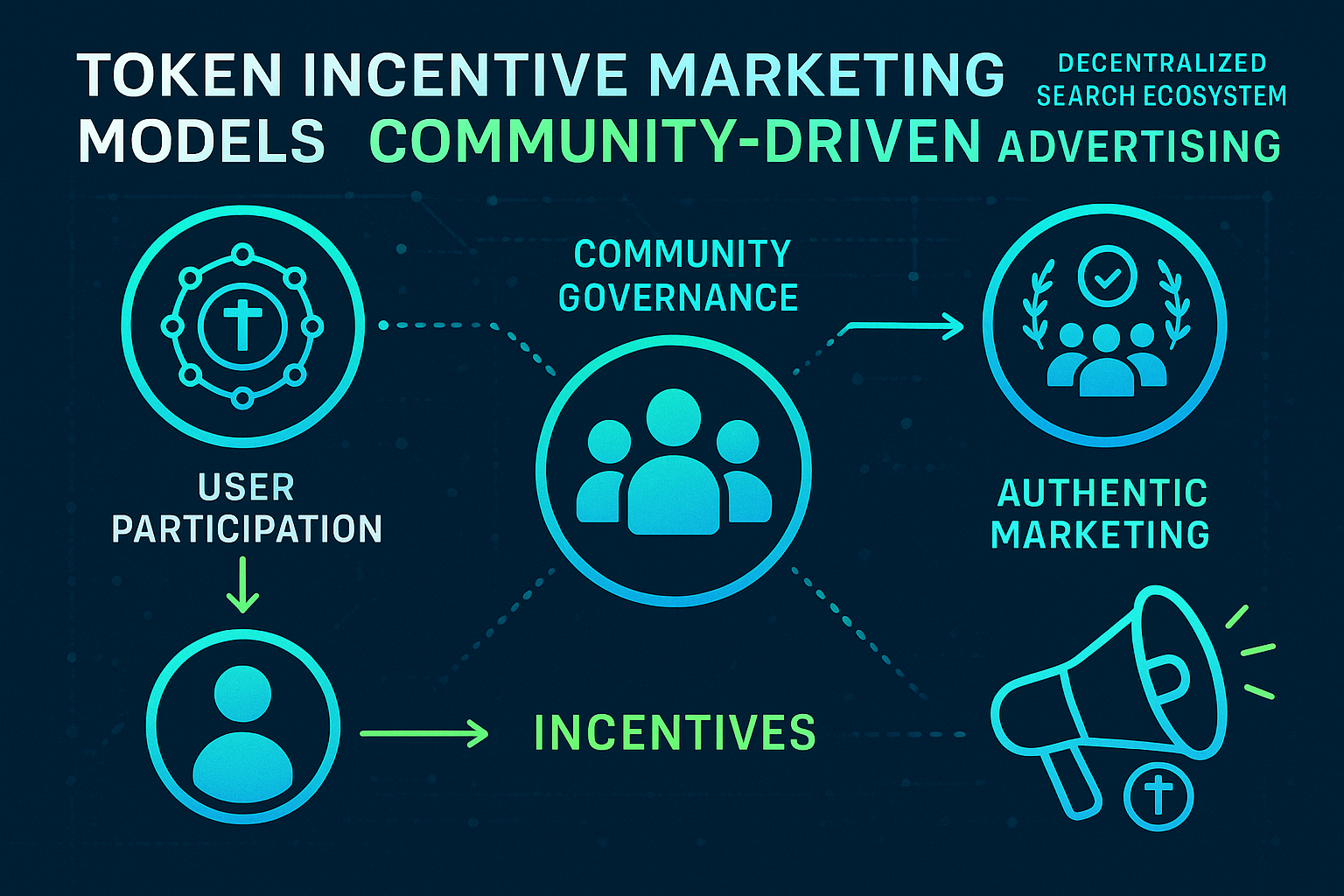
Marketing Strategies Using Decentralized Search Engines
Community-Driven Marketing Approaches
In decentralized search ecosystems, marketing success is intimately tied to community engagement and participatory governance. Unlike traditional models dominated by ad spend and opaque algorithms, authentic reach is achieved by nurturing communities through governance tokens, community curation, and decentralized ad placements. Stakeholders can propose, vet, and promote projects through transparent mechanisms, facilitating trust-based discovery and viral promotion.
Platforms like Presearch and SwarmSearch employ DAO-like models where advertising streams and curation rights are determined by token holders, ensuring only valuable, highly endorsed content rises to prominence.
Token Incentives and Advertising Models
Token incentives power unique advertising strategies within decentralized search engines:
- Rewarding users for engagement with native tokens
- Enabling token-based bidding for advertising slots, with proceeds going to the community
- Deploying smart contracts for ad validation and transparent delivery
Such models eliminate middlemen, reduce fraud, and incentivize genuine participation—ushering in an era of transparent, user-centric marketing where budgets are aligned directly with audience value.
Optimizing Visibility in Decentralized Search
Sophisticated decentralized search marketing involves building organic authority through community reputation, verified blockchain domains, and content-quality incentives. Key strategies include:
- Crafting metadata and rich semantic content that aligns with user intent
- Engaging with reputation systems and token staking to signal trust
- Leveraging open source decentralized search networks for distribution
SEO in Web3 prioritizes transparent discoverability: search rankings become a function of community endorsement, content authenticity, and alignment with Web3 values, not hidden algorithms.
Conclusion
Decentralized search engines are fundamentally transforming the digital landscape, empowering users with privacy, control, and the ability to discover content on their own terms. With privacy-first architectures, robust semantic search, and blockchain domain integration, these engines epitomize the shift toward digital sovereignty, censorship resistance, and fair participation within the Web3 ecosystem.
Web3 users, marketers, and developers now have the tools to shape discoverability, build verifiable identities, and employ innovative marketing models that reward authentic engagement. The growing ecosystem of decentralized search represents a bold step forward for the internet—one where users are no longer products, but empowered participants in a transparent and democratized network.
The future of digital discovery is open, secure, and community-owned. Explore decentralized search engines today to enhance your Web3 privacy, discoverability, and marketing impact.
Resources
- What Is A Decentralized Search Engine & Why Should We Care?
- The Future of Decentralized Search: Powered by RSS3’s Index, Oraichain’s AI, and Pinlink’s Infrastructure
- Presearch – the Community-powered, Decentralized Search Engine
- SwarmSearch: Decentralized Search Engine with Self-Funding Economy
- Web3 Compass: First ever searching engine in Web3
- 0xSearch
- Decentralized Search vs. Google
- DESERE: The 1st Workshop on Decentralised Search and Recommendation
- Decentralized Intelligence Network White Paper
- Experts Call for Decentralized Search Engines
- Decentralized Search Engine Token Economy
- Decentralized Search Engine Governance Models
- Open Source Decentralized Search Projects
- Blockchain Domains
- Web3 Browser
- Web3 Link Building: Adapting Strategies for a Decentralized Web
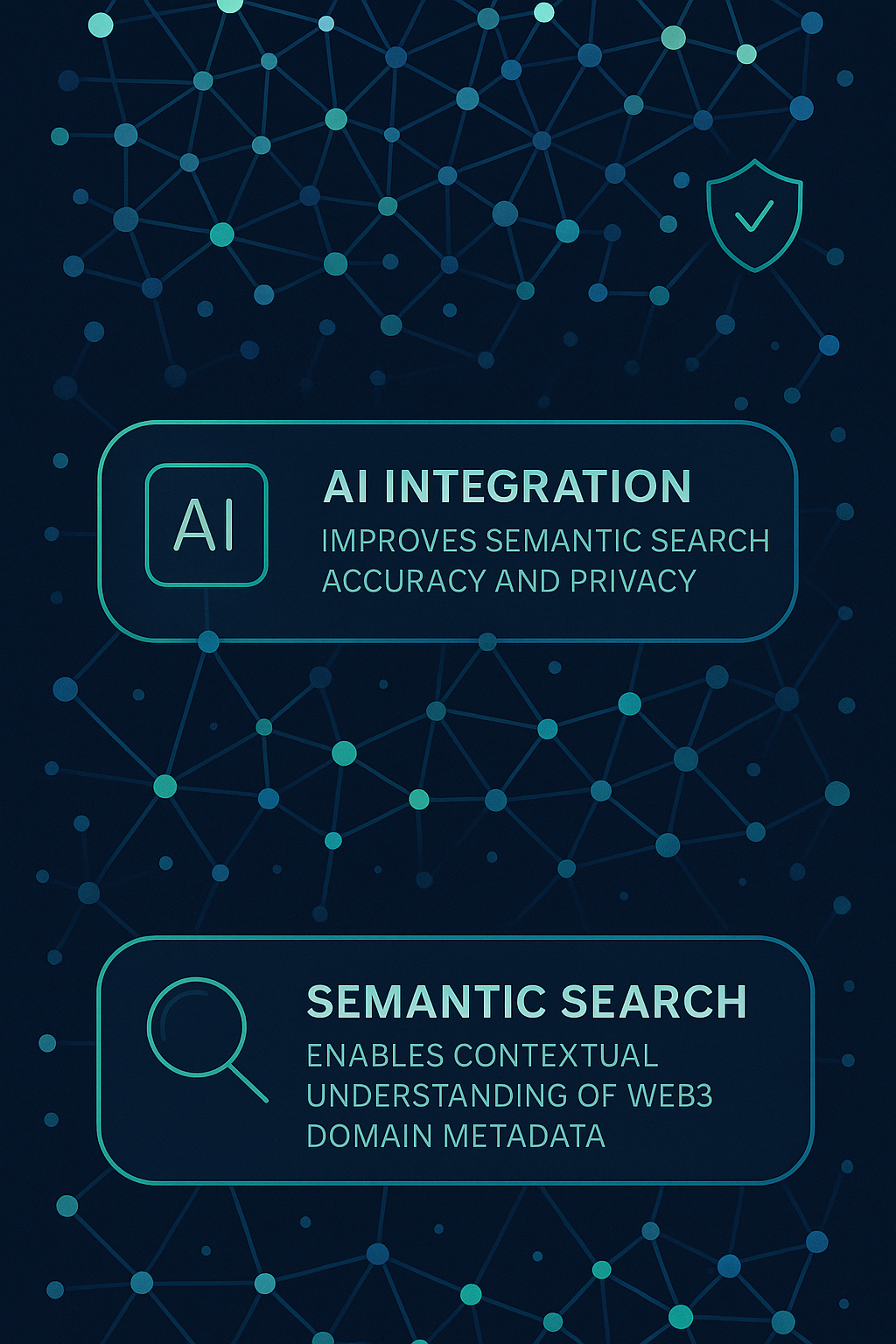
Leave a Reply